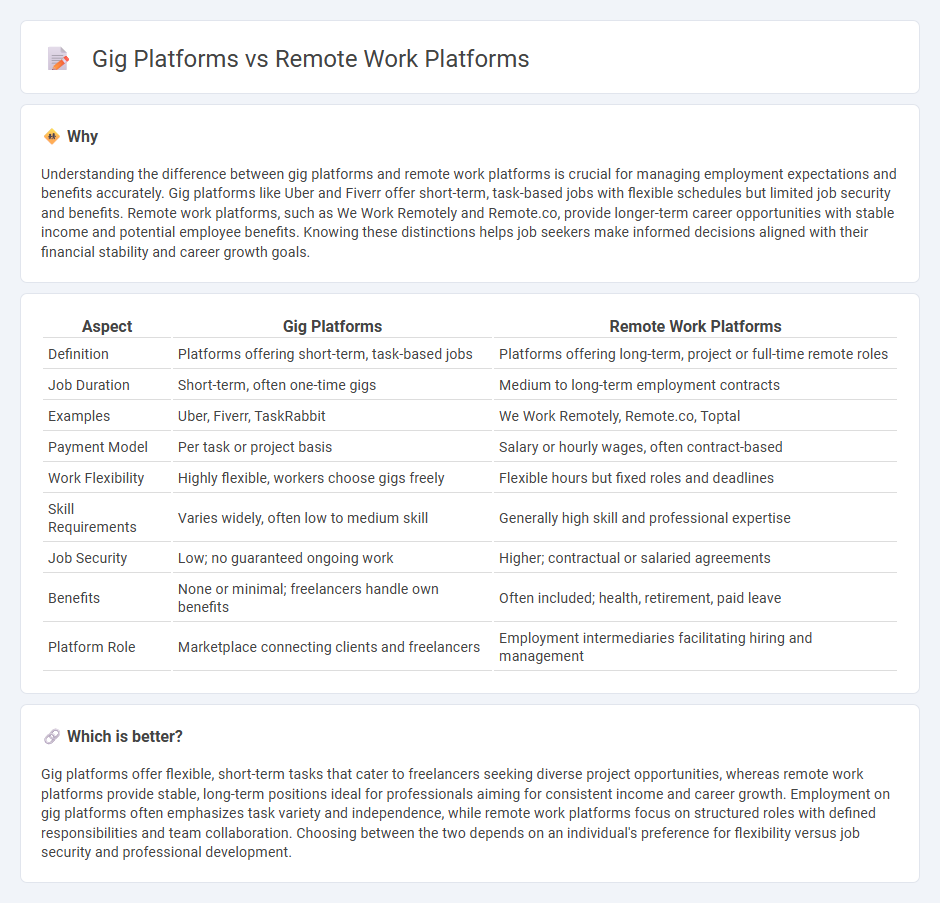
Gig platforms offer short-term, task-based jobs that prioritize flexibility and immediate income, appealing to freelancers and part-time workers. Remote work platforms connect professionals with long-term, salaried positions or project-based collaborations, emphasizing stability and career growth. Explore the distinctions between gig and remote work platforms to find the best fit for your employment goals.
Why it is important
Understanding the difference between gig platforms and remote work platforms is crucial for managing employment expectations and benefits accurately. Gig platforms like Uber and Fiverr offer short-term, task-based jobs with flexible schedules but limited job security and benefits. Remote work platforms, such as We Work Remotely and Remote.co, provide longer-term career opportunities with stable income and potential employee benefits. Knowing these distinctions helps job seekers make informed decisions aligned with their financial stability and career growth goals.
Comparison Table
| Aspect | Gig Platforms | Remote Work Platforms |
|---|---|---|
| Definition | Platforms offering short-term, task-based jobs | Platforms offering long-term, project or full-time remote roles |
| Job Duration | Short-term, often one-time gigs | Medium to long-term employment contracts |
| Examples | Uber, Fiverr, TaskRabbit | We Work Remotely, Remote.co, Toptal |
| Payment Model | Per task or project basis | Salary or hourly wages, often contract-based |
| Work Flexibility | Highly flexible, workers choose gigs freely | Flexible hours but fixed roles and deadlines |
| Skill Requirements | Varies widely, often low to medium skill | Generally high skill and professional expertise |
| Job Security | Low; no guaranteed ongoing work | Higher; contractual or salaried agreements |
| Benefits | None or minimal; freelancers handle own benefits | Often included; health, retirement, paid leave |
| Platform Role | Marketplace connecting clients and freelancers | Employment intermediaries facilitating hiring and management |
Which is better?
Gig platforms offer flexible, short-term tasks that cater to freelancers seeking diverse project opportunities, whereas remote work platforms provide stable, long-term positions ideal for professionals aiming for consistent income and career growth. Employment on gig platforms often emphasizes task variety and independence, while remote work platforms focus on structured roles with defined responsibilities and team collaboration. Choosing between the two depends on an individual's preference for flexibility versus job security and professional development.
Connection
Gig platforms and remote work platforms both facilitate flexible employment by connecting freelancers with clients worldwide through digital interfaces. Gig platforms primarily focus on task-based, short-term projects across various industries, whereas remote work platforms emphasize long-term, continuous employment opportunities with companies. Integration of these platforms empowers workers to diversify income streams while offering businesses scalable access to specialized talent in a global market.
Key Terms
**Remote work platforms:**
Remote work platforms facilitate long-term, project-based employment by connecting professionals with companies seeking specialized skills across industries such as IT, marketing, and design. These platforms prioritize collaboration tools, secure communication, and integrated payment systems to support ongoing remote work relationships. Explore the top remote work platforms to discover tailored opportunities for sustained career growth and flexible work environments.
Telecommuting
Remote work platforms enable telecommuting by facilitating long-term employment opportunities with structured roles, while gig platforms focus on short-term, task-based jobs often lacking consistent work hours. Telecommuting benefits from remote work platforms that support collaboration tools, project management, and employee monitoring, enhancing productivity outside traditional offices. Explore further to understand how these platforms shape the future of work flexibility and job security.
Distributed teams
Remote work platforms facilitate seamless collaboration and project management for distributed teams by providing tools like video conferencing, task tracking, and cloud storage, enhancing productivity across time zones. Gig platforms connect freelancers with short-term contracts but often lack integrated team coordination features crucial for sustained distributed team performance. Explore in-depth analyses to understand which platform best supports your distributed team's goals and workflows.
Source and External Links
FlexJobs - A leading platform for finding legitimate remote and flexible jobs, with over 100,000 listings across various categories, verified to avoid scams and junk posting.
Jobgether - The largest remote job platform with over 200,000 remote jobs, offering location-specific filters and a matching algorithm to connect candidates with remote opportunities quickly.
Remote Work Platforms And Suggestions - Overview of popular remote work platforms including FlexJobs, Remote OK, and UpWork, which offer extensive remote job opportunities spanning full-time, part-time, freelance, and project-based roles.
 dowidth.com
dowidth.com